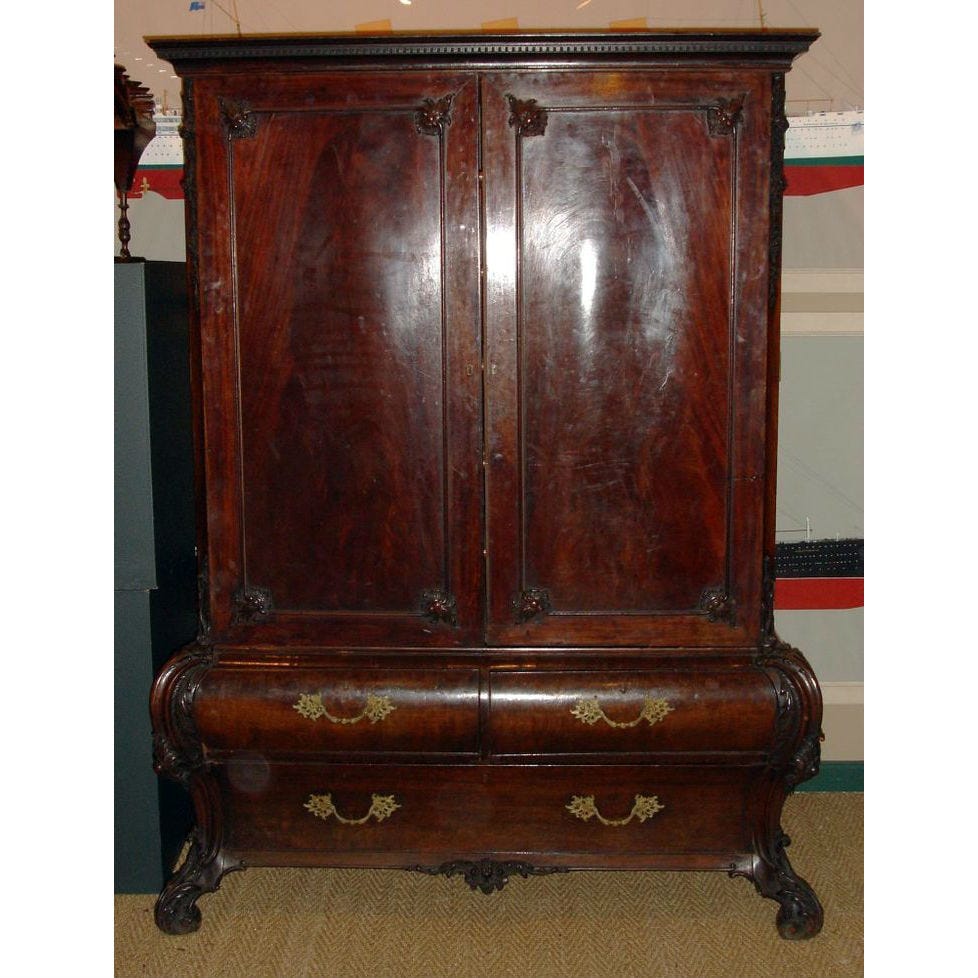Readers unfamiliar with "The Press" by Graham Masterton may prefer to read these notes only after reading the story.
"The Press" is the first fiction I have read by Graham Masterton. Like Reggie Oliver's "Feng Shui" and Oliver Onions' "The Rosewood Door," it details the risk inherent in old furniture.
Especially when once owned by Padraic Rossa.
....Rossa’s last work All Hallows Eve was published in 1997 and was little more than a splenetic rant about the way in which the Irish had allowed the rest of the world to turn a sacred Celtic ritual dating back to the 5th century into a “cash cow for the makers of plastic pumpkins and Hallmark Cards.”
....You no doubt remember, though, that five of the reviewers who gave Rossa such critical notices disappeared on the night of All Hallows’ Eve, and no trace of them was ever found. There was a lengthy investigation by the Garda Síochána, during which Rossa was questioned several times, but he made no comment about their vanishing, except to say that they had probably got what they deserved. Nervous jokes were made in the press about “the curse of Padraic Rossa” and stories were told in Henchy’s Bar that he had summoned up Satan to drag his critics down to hell, their way lit by embers, in turnip lanterns, as Satan did to all unrepentant sinners, at Halloween.
Shades of Mr. Karswell!
A real estate journalist, a photographer, and an auction house rep go over Rossa's crumbling house:
....At the far end of the room stood a huge mahogany cupboard, with carved pillars and bunches of grapes, which must have been used for storing china. In Ireland we would call a cupboard like this a press.
“That is a massive piece of joinery and no mistake,” said John, taking pictures of it. Its finial touched the ceiling, and it had a wide drawer underneath with handles in the shape of demons’ faces, with rings through their noses....
....It was completely empty, but it was unexpectedly large inside, almost three times as deep as it looked from the outside. It had that sour vinegary smell of old cupboards that have been closed up for years.
The journalist, like Mr. Burton in Machen's "Novel of the Iron Maiden," is left to report:
Fionnula turned the key in the lock and opened up the press so that we could look inside. It was completely empty, but it was unexpectedly large inside, almost three times as deep as it looked from the outside. It had that sour vinegary smell of old cupboards that have been closed up for years.
“You could almost live in this,” said John. “In fact I think it’s bigger than my flat. And look . . . what’s that written on the back?”
The back of the press was covered in lettering, faded black, with some gilded capitals. It looked like Gaelic.
“We’ll have a picture of this,” said John. “Here, bespectacled beauty from the auctioneers, do you think you could hold my light for me?”
He helped Fionnula to climb up into the press, and then he climbed in after her. He handed her his electronic strobe light and started to take pictures of the lettering at the back. “Now I recognize some of the words here,” he said. “Beó duine d’éis a anma . . . that means ‘a man may live after his death.’”
He peered at the lettering even more closely. “This is some kind of Celtic incantation . . . a summoning-up of dead souls. It must be connected with Rossa’s book on All Hallows’ Eve.”
As his fingers traced the words, however, I heard an extraordinary noise. A slow, mechanical ticking, like a very loud clock, but punctuated by the clicking of levers and tumblers, and the flat donk sound of expanding springs.
“What the hell’s that?” asked John, turning around. But before any of us could do anything, the huge doors to the press swung silently shut, and locked themselves, trapping John and Fionnula inside.
“Will you open the effing doors, Michael?” shouted John. “This isn’t a joke!”
“For God’s sake, let us out!” said Fionnula. She sounded panicky already. “I can’t stand enclosed spaces!”
I turned the key, but the doors wouldn’t budge. I went to the sideboard and pulled open the drawers. One of them was full of tarnished cutlery, so I took out a dinner-knife and tried to pry the doors open with that. They still refused to open. Both John and Fionnula were hammering and kicking on them, but they were so solid that they didn’t even shake.
It was then that I heard two more sounds. A high-pitched squeaking, like a screw turning, and then a sliding noise.
“John!” I shouted. “John, are you all right? I’m going into the garden, see if I can find a shovel or a pick or something!”
But John yelled, “The ceiling! The ceiling’s coming down!”
It's a wonderful horror moment, and several more build toward the story's end. Masterton effortlessly conducts the reader from peak to peak, and never permits us not to be entertained.
Jay




